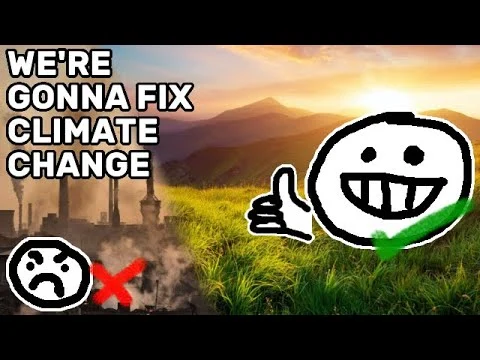People should respond as if it is fixable, even if it is not. Any mitigation or reduction is positive. If you’re gonna go out, go out swinging. Reject the status quo. Expect more from yourself and others.
And also go Vegan 🤗
But it is fixable!
That’s the spirit!
The problem is fixable, but my biggest worry right now is that rich nations will do enough to save rich nations. They’ll get most of their power from non-carbon based sources, pollute significantly less from industrial processes, protect their agricultural output, and switch 90% of cars on the road to BEVs. Then they just deal with the problems of increased flooding, wildfires, etc.
Meanwhile, the Middle East turns into a power vacuum because nobody wants their major export anymore. Africa starves to a level not seen in decades, or maybe ever.
and unionize ✊
Being a doomer doesn’t help
Doing nothing didn’t help
Assuming science will somehow solve the problem magically with no input doesn’t help
Assuming nothing you do matters because there’s people in China doesn’t help
It’s don’t as though we’re fucked so why not be a doomer
Dismissing problems using cheap labels like that helps even less. Actually causes harm.
Pretending we are all doomed just leads to inaction. Why bother, if we all die anyway.
Pretending all will be great just leads to inaction. Why do something yourself, when it is basicly solved already.
What works is to understand that there is a problem, but we have the solutions. That is actually the case right now. We have a massive problem with climate crisis, but we also have the tools to bring our emissions to basicly zero, if we choose to do it. Some countries are already taking actions on this.
@MrMakabar @XTL The main problem is that we need to end Capitalism, and we need to end it NOW, globally, because every possible solution only works if the economy can stagnate or even shrink without causing economic disasters.
A long term stagnating economy and especially a shrinking one would be considered an economic disaster anyway. The key is to avoid social problems due to shrinking the economy. There are plenty of ways of doing that, but propably the most important one is to limit working hours. That means earlier retirment, less hours worked per week and more vacation. All of that are things mandated by countries before. With a globally stagnant population that might very well happen. In fact you see falling working hours in Europe over decades.
deleted by creator
I’ve sat on a meeting in a big corporation where one of the middle managers straight up said that if you’re not growing as a company, you are stagnating. How that math works in the long run was not covered.
That’s what we’re up against.
It comes from experience for a lot of poor voters, that policy changes tend to hurt them and help the rich. Unfortunatly that is not without reason.
We are doomed, but 2c is infinitely better than 3c and we should be fighting like hell for every .01c.
@MrMakabar @XTL we have the tools, but governments wedded to profit and growth won’t use them, and certainly won’t use them quickly enough.
We’ll need a wave of revolutions to improve our democracies; shortening terms, dispersing power to communities and as much as possible moving from electing representatives who can be easily captured and subverted to truly democratic decisions which are harder to manipulate.
Degrowth basicly tries to limit change the size of the economy to one, which stays within planetary boundaries. One of the most important ones of that is certainly greenhouse gas emissions. So something like the emissions trading systems of the EU are inherintly degrowth policies. They cap emissions and lower that cap over the years. Some industries are already in some trouble due to that, namely the coal electricity industry, but a lot of other heavy industry in the EU has problems as well due to that policy right now.
Another big one is increasing wild space, which the EU also has passed a law, forcing its members to rewild a few percent of their land. That is limiting resource use for sure.
There are also a lot of other enviromental regulations doing similar things. The problem is not moving fast enough and still believing in economic growth, but there are policies, which go very much in the right direction and are more then just token policies. Obviously a lot more is needed, but change within the current system is certainly possible. However you are right, the fear of a drop in gdp has to go and be replaced with a the idea of improving quality of life. Obviously having a strong economy helps with that, but still it should be an option, if the econmy shrinks.
@MrMakabar emissions trading schemes don’t reduce emissions, they just change where those emissions take place. Until we calculate emissions based on consumption all we’ll do is outsource emissions to places with looser regulation, and there’s no incentive for those places to change.
The EU re-wilding provisions were neutered, and even if they hadn’t been, it wouldn’t have come close to meeting land use requirements to offset current emissions.
@MrMakabar Political capture will prevent meaningful change until it’s far too late, because the money that finances political parties or provides jobs for their constituents has a profit incentive that can never be squared with climate action.
The world will need to change. We either seize the day and change it ourselves or we watch it spiral into resource wars and 100s of millions dead or displaced.
We’re already past the point where capitalism can innovate its way out of the crisis.
You mean something like CBAM, which adds tariffs as high as emissions would cost in the EU to goods imported by the EU minus emissions pricing within the country of origin. That is imho one of the best policies you can come up with. It pretty much all EU goods to have emission pricing and has a real insentive for other countries to have one to as to not pay tariffs to the EU, but get the money themself.
That bill passed already and will be enforced by 2026.
@MrMakabar I used to be in favour of that system until I realised it only works when there are alternatives, and there aren’t for most goods and services. If you can’t swap to something clean, then all it does is raise the price.
It increases the burden on the worst off in society, without in any way impacting the wealthiest; like all eco-austerity policies.
deleted by creator
deleted by creator
@MrMakabar @XTL You put something in the words I always struggled to do. Thank you!
@MrMakabar @XTL Why bother? to make the doomedness less shit. Do the things that move the needle from certain death to near-certain death. By teeth and fingernails, hold on until the last.
Doom stops when people have hope. Teaching people how to climb to a solar punk future is the solution.
We need solar punk political candidates.
I don’t know the first thing about campaigning but I’ll run.
How you run varies a lot by country.
In the US, you start by filing papers to do it. Typically a combination of a fee and collecting signatures. Municipal government tends to have a lot of power over things like what commute mode is favored and local building codes, so I recommend it for first-time candidates. You’ll need to raise enough money to help get the word out, spend a lot of time visiting community groups and talking with people, and ideally recruit a few volunteers to help you win a primary.
You’d be surprised how easy it is. Many political parties will allow anyone to run for a seat if no one else is already doing it. A lot of the smaller parties will even actively seek out good candidates.
There’s vetting of course, but so long as you’re not a terrible person and haven’t said anything publicly that’s opposed to the party’s platform, it’s really not too hard.
The hard part is when it comes to the larger parties that have established (often terrible) candidates. The party knows them, so you have to put in the time to get known as well and then run against the sitting candidate when the time comes.
It does happen though. AOC in the US is a great example. She unseated a democrat that the party actually liked, and she did it with an army of new members she got signed up.
We need solar punk political candidates.
Please run for office.
Not only representative politics. We need to focus on grassroots initiatives as well.
Both is good
So you’re a fan of grassroots initiatives.
Doom stops
Bet
A geologist friend of mine ran for something local. She didn’t win, but I was very proud of her for engaging in the process. She would’ve been a great leader for whatever she was running for. I don’t recall the details, as she lives in another state.
The section on how much solar can power homes is off. The deployed capacity is measured by the output of the panels in direct sunlight on a cloudless day. Obviously, that doesn’t happen all the time, or even most of the time. Exact measurement depends on local conditions, but if you take the figure and reduce it by 80%, you’ll have a rough idea of how much is actually going on the grid over time.
So when he’s citing how many homes can be serviced by 1GW of solar, multiply that figure by 0.2 and you’ll get something closer to the real one.
Solar and wind deployments, combined with some kind of energy storage, are important, but we shouldn’t drop wildly misleading figures. If the numbers in the video were right, then we’d have solved the problem of carbon-based electricity generation already.
Yeah, when I hear GW/h, I immediately stop listening. Also, people should raise awareness to the fact that just using better energy won’t help. We’re facing an ecosystem problem crisis, the energy problem is secondary.
Anyway, I like the good vibe
Pessimism of the intellect, optimism of the will.
Actually, I did hear about CFCs being successfully replaced and the ozone hole closing. The reason that happened was that CFCs were replaced with something almost identical, manufactured by the exact same companies.
With fossil fuels, there is no straightforward direct replacement. They have to be replaced with something completely different, not merely slightly different, and the companies that make them will go out of business if such a change is implemented. Needless to say, they’d sooner kill every last one of us than allow that to happen, and so far, they’re on track to succeed in their destroy-all-humans plan.
deleted by creator
https://youtube.com/watch?v=LxgMdjyw8uw&feature=share9
Video by Kuzgezart that has similar viewpoints and a LOT more data than BritMonkey’s, but the biggest thing is they show we actually are on track to avoid the biggest apocalyptic scenario (which would be a 4C+ temperature increase). Yes, it’s going to suck ass, real ass, but we won’t all die. And hell, if by then to now we managed to avoid 4C to 3C, which is what most scientists are predicting, maybe by 10 years more we’re at 2C.
foolish of you to think that is a bad thing.
There is no greater hell than immortality.
deleted by creator
I guess a discussion on shared meaning of what it means to die would be needed to understand if not dying as possible future/current/previous state in the universe and directly address your request to change your mind.
deleted by creator
Honestly thank you for sharing this. I watch this and Kuzgezart’s video about the topic whenever I feel way too depressed about shit like this nowadays.
Anyone have a newpipe link of the video?
Newpipe is an app. You are probably thinking of invidious or piped in which case: https://inv.tux.pizza/watch?v=TBYDgJ9Wf0E
Reject doomerism, embrace fatalism














